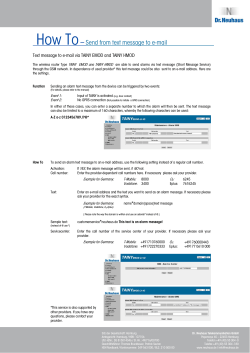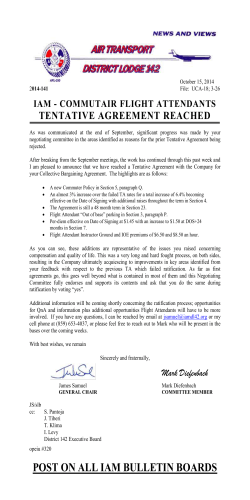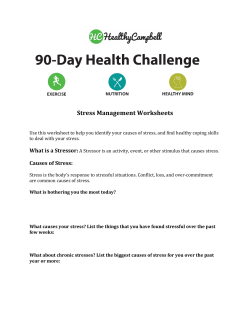
Theories of Stress: Chapter 1 Overview
Stress Cycle Life 101 Effects of Coping Attitude Coping Skill Definitions Stressor- a stimulus with the potential for triggering Fight or Flight 4 categories (Social, Environmental, Psychological, Philosophical) Stress reactivity- Body changes to meet demands (F or F response) Strains-Outcomes of stress reactivity and may be physical, psychological, or behavioral. (tension headache, phobias, addictions) Stress- The wear and tear on the body when there is reactivity. Combination of a stressor, stress reactivity, and strain. Homeostasis- The body’s balanced state Eustress- Good stress Distress- Bad Stress Duration/Degree Duration= the amount of time our body’s physiology varies Degree=Condition or the amount of physiological variance Walter Cannon- Harvard Medical School First to describe the effects of acute stress Termed this stress reaction as the fight-or-flight response A primitive response that quickly increases heart rate, respiration, blood pressure, and serum cholesterol Acute Alarm Reaction Body prepares for fight or flight Time of emergency Heart pumps blood faster and with greater force Blood pressure elevates abruptly Lungs send more oxygen to muscles Faster blood clotting Acute Alarm Reaction Widening of the pupils to admit more light in order to heighten visual acuity and awareness Increase in breathing rate Endorphins released – decrease in body’s sensitivity to pain Elevated blood sugar levels Hans Selye Studied the effects of long-term (chronic) stress Stress is- “The nonspecific response of the body to any demand made upon it” Summarized his findings by proposing a three-phase process called the general adaptation syndrome alarm reaction stage of resistance stage of exhaustion Other Influential Researchers Simeons Psychosomatic disease Benson Relaxation response Vogt Autogenic training Jacobson Progressive relaxation Stress Theory Several theories explain the causes of stress: Holmes and Rahe- Life events theory: stress occurs when the situation requires more resources than are available Kobasa and colleagues- Hardiness theory: one’s attitude toward the events determines stress, not the event. Social support theory: insufficient social support for responding to event Fight or flight response Is the glass half full or half empty? A situation can be stressful or not -- it all depends on your perception of the event A response to stress can be effective or not -- it depends on your resources and coping strategies Refer to table 1.2 (p.13) Relationship between stress and illness…. Goals for Stress Management Do not eliminate all stress Use as a motivator for peak performance Stress can be useful, stimulating, and welcome Limit harmful effects Limit the harmful effects of stress while maintaining life’s quality and vitality.
© Copyright 2026











